- Home
- Katherine Paterson
Bread and Roses, Too Page 5
Bread and Roses, Too Read online
Page 5
"Rosa."
"Yes, Miss Finch."
"You were absent Friday afternoon. Do you have an excuse for that?"
"No, ma'am."
The teacher stood up and came to where Rosa waited. "You must not let your parents—your mother, rather—keep you from school. You understand that, don't you?" she said softly.
"Yes, ma'am."
"I hope you were able to persuade her not to strike."
Rosa just hung her head. Miss Finch's shoes were almost new—leather boots laced tight. Her feet would never feel the snow leaking through the soles.
"Rosa, I'm speaking to you, dear. Look at me, please."
She raised her eyes to look at the teacher's pale face pinched in disapproval. It was thin, but had Miss Finch ever known real hunger?
"Are the people in your family a part of this terrible strike?"
"They're hungry, Miss Finch." Rosa nearly whispered the words, but the teacher had heard her. She could see Miss Finch's eyes blink, and she began to fiddle with a pencil she held.
"You know what Mr. Wood said. The mills can't afford to pay wages for fifty-six hours' work when they're only getting fifty-four."
Something stiffened inside of Rosa. "But he got five houses."
"He has five houses."
"Yes, ma'am. And so many automobiles he can't count them."
Miss Finch jerked her head. Her cheeks reddened. "I think that was meant as a jest. Nonetheless. Your parents are breaking the law."
"My papa is dead."
"Yes, you said. I'm sorry. Truly. But whoever in your household is taking part in this wretched business needs to be warned off. Do they realize that Joseph Ettor is an anarchist? That means, Rosa, that he doesn't believe either in God or the law. He's"—she lowered her voice and her head and said, almost in a whisper—"he's a Marxist."
"Father Milanese says we have the right to ask for a living wage."
Miss Finch sniffed. "Father Milanese is not in line with the rest of the religious leaders of this city, all of whom have denounced the strike as godless and lawless. Isn't he Italian?"
"Yes, ma'am."
"There, you see. I'm sure your bishop will soon set him straight."
There was no need to remind Miss Finch that she, Rosa, was also Italian, as was her entire family. Despite the two strikes against her—that she was both Catholic and Italian—Miss Finch had always encouraged her.
"Well, I had hopes for you, Rosa." She walked away and put the pencil down on the desk, expecting, perhaps, that Rosa would disappear.
"Please, ma'am. I want to learn. You said I should make something of myself."
The teacher came back and put her hand gently on Rosa's shoulder. "Yes, I did. I'm just—I'm just afraid for you, Rosa, dear. There are so many obstacles...."
"Yes, ma'am."
"Try to persuade your mother not to strike, won't you? It's a terrible mistake. Those outside agitators ... They can't be trusted."
"He said no violence. That's what he told everybody."
"Who said that?"
"Mr. Ettor."
Miss Finch's hand went from Rosa's shoulder to her own throat. "He's the worst. Rosa, you mustn't believe anything he says. He doesn't care for the mills or the workers here in Lawrence. He is only after power for himself. There'll be terrible violence. He'll do awful things and try to blame others. People will get killed. You'll see."
Rosa left the school. She should have run, there was so little time before the afternoon session, but the streets were too crowded for her to run properly, and, besides, she needed to think. Could Miss Finch be right? Could the man Mamma and Anna and all the workers were following be only after power for himself? A boy had been stabbed this morning. But it was the militia who had done it, not the workers. Unless ... unless Miss Finch was right. Unless Joe Ettor would try to blame the police and the militia for things his own followers had done. Rosa shook her head to try to clear it. Everything was too confusing. Whom could she believe? It was a messy, terrible business. She wanted her mother and sister out of it no matter who was right and who was wrong. It was just too dangerous. Suppose they got killed and she was left alone with only little Ricci? They'd starve for sure—if they didn't freeze first.
The Return of Rosa's Rat
Rosa went back to school on Tuesday. What else was she to do? Mamma and Anna and the Jarusalises were so involved in the strike that they were always out, meeting, picketing, or marching. She'd tried to convince them how dangerous it was until she was hoarse, but Mamma just patted her on the head and went out the door. Granny J. was busy with her grandsons, Jonas and Kestutis, and little Ricci, and Rosa couldn't talk to her anyway.
The big news at school was that Joe o'Brien had been arrested. "Arrested?" Rosa said. "Why?"
"Oh, he wanted to be a big shot. He went down to the picket line, where a bunch of strikers were throwing snowballs at the police. They took 'em all to jail." Luigi was grinning. "But Joe's got him a Irish daddy. He hauled Joe home and said he couldn't leave the house till the strike was over. He was lucky. The judge give the men a year."
"For throwing snowballs?"
Luigi nodded solemnly. "For throwing snowballs."
When Miss Finch walked into the classroom, the straggly remnant of what had once been the class stood up. They weren't always so polite, but the strike had infused a bit of pride into the children of the strikers.
Miss Finch smiled faintly at the gesture. "You may be seated, class," she said.
"You hear about Joe, miss?" Luigi asked.
"Yes," she said and hesitated, as though undecided as to how to proceed.
"He almost went to jail!" Celina said.
"Joseph was very foolish," Miss Finch said. "And, although it is a shame that he will be missing so much school, I think his father is wise to keep him off the streets. I trust this will be a lesson to you all—if you had any thought of becoming involved in this ugly business."
Rosa winced.
"I'm sure some of you think a year in jail is an unreasonable sentence for throwing snowballs. But as the judge said, 'The only way we can teach them is to deal out the severest sentences.' It should certainly make other Italian strikers think twice before they show such disrespect to authority."
"Joe ain't Italian," Luigi said.
"And he should have known better. Now, those of you who have arithmetic books..."
But Rosa couldn't put her mind on sums. What if Anna were arrested? After all, she had been right up front in the parade with her big American flag. The police were sure to notice her, and Anna wouldn't be able to stand being in jail for a day, much less a year. or Mamma, who had been singing louder than anybody? Her heart skipped a beat. If Mamma were arrested, none of them could survive. She had to persuade Mamma to go back to work. or at the very least to stop marching and picketing.
That evening she tried again. "Mamma, they put some men in jail—for a whole year. Just for throwing snowballs."
Mamma sighed. "They tell us law show no favorite, but how can you say that? Put a man in jail for throwing snowball."
"What if they put you in jail?"
"Who, me?" Mamma laughed. "Me? I just stupid Italian woman. What do they care about me?"
"Mamma! They'll put anyone in jail for the least little thing."
"Can they put ten, twenty thousand peoples in jail? only jail big enough is the mills, and we already been in those."
Mrs. J., Anna, and Marija laughed at that. Anna laughed so hard, she began to cough. Mamma got her a cup of water and put her arm around her. She murmured to Anna while the girl sipped the water. Rosa watched in horror. Was it just the winter weather or was Anna getting sick in the lungs the way so many of the girls did?
She was startled by Mrs. J.'s jovial "And we ain't goin' back till dey do what we say, hey, Alba?" Mrs. J. had taken to calling Mamma by her first name. Mamma looked up, her worried look gone. It wasn't right. The Jarusalises were boarders whose no-good papa had run off. Now all of a sud
den, Mrs. J. was acting cozy as a sister to Mamma, and Mamma didn't even seem to mind. She was smiling.
"Oof," she said, dropping into a chair. "My feet tired, just like I work all day. Go down street, Marija. Find out where we meet tomorrow." Anna started for the door. "No, not you, bambina. You rest a bit here with Mamma. We got to be strong for tomorrow."
"Mamma!" Rosa couldn't believe her ears. "You're not going to parade again tomorrow?"
"I do if Joe Ettor say so."
"Mamma, you're just letting those godless anarchists push you around!"
Mamma snapped around to look at her. "What do you know, Rosa? You see inside Mr. Joe Ettor's heart?"
"Miss Finch—"
"Don' 'Miss Finch' me, okay? She know school, she don' know nothing 'bout mill work or Mr. Joe Ettor, neither. Now go on, Marija. Run ask Mrs. Marino where we meeting tomorrow morning. And you, Anna, go lie down on the bed a minute." Anna hesitated. "Go on, obey your mamma." Anna went into the back room, but she left the door open, as though afraid she might miss something.
Mamma settled down in her chair, and then to Rosa's horror she leaned forward, took off her worn shoes, and began to rub her feet—right there in front of Mrs. Jarusalis. She breathed out a huge sigh, making Mrs. J. laugh again.
"Goot idea, Alba," she said, taking off her own shoes and raising a big, dirty foot across her knee to rub it, her skirt hiked up almost to her waist.
Was the strike going to turn them all into savages?
"Oooh, could I use a cuppa coffee now," Mamma said.
"Can you still remember da taste?" Mrs. J. asked.
"Never forget coffee. Like you don' forget your first kiss." Mamma's eyes were closed, and she licked her lips, as though tasting either the coffee or the kiss, making Rosa cringe with embarrassment.
"I have to do my homework now."
"Good," said Mamma without opening her eyes. "Good girl."
After she had finished her homework—what she could do of it without an arithmetic or grammar textbook—Rosa stayed in the front room with the door closed. She could hear the women talking and laughing; even Granny and the little Jarusalis boys were joining in the good humor of the evening. Mamma and Mrs. J. were the happiest they'd been since they'd lived together. It made Rosa angry. Mamma was ruining her life—all their lives—with this crazy strike. Anna would get sick, and they'd starve—which reminded her that no one had even mentioned supper.
Just then the door to the hall flew open, and Marija burst through it and headed for the kitchen. "Close the door!" Rosa cried, but Marija didn't hear her. She was rushing in with news. When Rosa got off the bed to close the door herself, she heard them all talking at the same time, their words tripping over each other. Rosa heard the word "food" and, in spite of herself, went to the kitchen to find out what the excitement was about.
Anna was already up from her rest. She turned when she saw Rosa standing there. "They've set up a soup kitchen!" she said, her eyes dancing. "Union workers from Boston and Lowell brought it. And they say people are going to send money from all over the country! Workers everywhere want to support us in the strike!"
Mamma was on her feet. While the girls gathered bowls and spoons for all of them, Mamma went into the back room and took the still sleeping little Ricci out of bed and wrapped him in her shawl. "Come," she ordered. "Everybody to the Italian hall."
Rosa stood aside and let them all pass her. She hung back. At the front door, Mamma turned. "Come, Rosa. You, too."
Rosa hesitated. "It's like begging when you can't pay," she muttered.
"It's like feasting," Mamma said. "Come on, don' be a fool. You need to eat." She reached out her free hand and said gently, "Come on, my Rosina. Don' be sour face."
Rosa didn't take Mamma's hand, but she followed her down the stairs and out into the street. Everyone was in a carnival mood, heading for the various ethnic halls where there was food to be had. "Come on, Marta," Mamma said to Mrs. J. "You come to Chabis Hall. Be Italian just for one night. Too far to walk to Sons of Lithuania, okay?" Mrs. J. laughed and all the J.'s went with them to Chabis Hall, where tables and chairs were set up. They were among the first, and Mamma sent Granny and Rosa and little Ricci and the boys to save seats while the women and older girls stood in line.
The soup was thick with vegetables and bits of meat, the aroma alone almost enough to fill an empty stomach. There was fresh crusty bread, too, more for each person than any of them had had for months. "See, Rosa," Mamma said. "We don' starve if we strike. Our union friends help us."
Rosa didn't answer. Her mouth was full, but she couldn't help wondering what happened when you ate the food of atheists and anarchists. Was it like taking the host when you were in a state of sin? Did you go to hell?
Rosa lay in bed, unable to sleep, the taste of the thick soup still in her mouth. She should never have gone to the hall. When you're hungry, you can so easily be led astray, and they had been led astray. Even the people who had no desire to strike, who only stayed out of work because their fear of the neighbors was greater than their fear of the mill owners—they had gone to the halls and eaten the food sent from the union members in Boston and Lowell, and they had been warmed and filled and they had forgotten to be wary. She flung herself over in bed. Granny J. grunted. She mustn't wake the old woman up. Mamma would be furious with her. If Granny complained, then Mamma and Anna and Ricci would have to give their bed in the back room to the old lady, and the three of them come and share Rosa's already too small bed. But at least they wouldn't snore, not the way Granny did. Jonas and Kestutis, who shared the narrow cot next to the opposite wall, were sleeping peacefully. It hadn't worried them to eat the food of atheists. Only Rosa. Everyone else had just laughed at her fears.
Granny J. turned over, snatching most of the quilt as she did so. Rosa wanted to pull it back, but she knew she mustn't. What would happen when the J.'s stopped paying rent? They would, of course, when they had no earnings. If Mamma stopped paying the rent, would Mr. Wood throw them out into the snow? No. Mr. Wood had once been a mill worker. He knew how it was. He wouldn't be so cruel.... Or would he?
The questions inside her head were so noisy that she almost didn't hear the sound. Then she did. It was the sound of someone knocking ever so gently on the door. She climbed out of bed and tiptoed to the door and put her ear on the keyhole.
"Hey, shoe girl," a voice whispered. "You awake?"
Rosa nodded.
"I say, girl, you there?"
"Oh. Yes. Is it you?"
"Yeah. Can I come in?"
She turned the key and opened the door a crack. "What are you doing here?"
"Ah, come on," he said. "It's freezing out there. I'll sleep in the kitchen, like before, all right?"
"No, it's not all right," Rosa whispered, looking nervously toward the lump in the bed that was Granny J. "Go home and sleep. I bet your parents don't even know where you are."
"Who you think I'm running from?"
She hadn't thought of that—someone who had to run away from home and not toward it.
He was already pushing past her into the room. "I'll be gone before they're awake," he said as he went through to the kitchen. She closed and locked the front door, not knowing what else to do or how to get rid of him.
She wanted to tell him not to take any bread this time, but how could she? She'd had a big bowl of soup and a huge slice of bread all to herself just a few hours before, and besides, the bread left in the kitchen was hard and moldy. Rosa watched him lie down, curling close to the cold stove, with his back to her. She could hear Anna's coughing from the other room. It sent knives through her own chest. She waited a minute before leaving the kitchen. She quietly shut the kitchen door, and then she leaned against it, her heart beating too fast. Why had she let the boy in? She didn't even know his name—all she knew was that he was a thief who had stolen bread from them the last time she'd felt sorry for him and let him sleep in the kitchen. And he'd do it again. She was sure of that. Well, it
was too late now. She crept back to bed.
Granny was sprawled all over the bed, so Rosa lay stiffly in the narrow space left to her and recited multiplication tables in her head to keep from thinking about all the things that were bombarding her mind.
Why was Mamma shaking her shoulder? It couldn't be morning yet.
"What is it, Mamma?" She spoke without opening her eyes.
"Shh. Hush. It's Anna, and I don't want to wake anyone up." Anna leaned over and whispered in her ear. "Who is that guy in the kitchen?"
Rosa was wide awake now. "What guy?"
"What do you mean, 'What guy?' I got up to get a drink of water and nearly tripped over him. Scared the life out of me. Come on, Rosa. You know who I mean—the boy that smells like a canal, who's lying right now on our kitchen floor."
"Oh, him."
"Yes, him. You let him in?"
She nodded, not daring to look Anna in the face, even in the dark.
"Did you? Then you must know who he is."
"He's—" Oh, dear, she still didn't know his name. "It's uh ... Fred—from school."
"Well get Fred or whatever his name is out of here fast."
"I can't. He's got no place to go. He'd freeze to death outside."
"Heaven help us, you're right. Well, get him out of here before Mamma wakes up and catches him, understand?" She sighed. "Now go back to sleep, but make sure—"
"I will. You, too."
"How can I go back to sleep? My heart is pounding like a beater on a loom. Such a fright!"
"I'm sorry, okay? I'll get him out early."
"Be sure you do."
But she slept so late, Mamma was pinching her toes and telling her she'd be tardy for school. She sat up quickly. Granny and the little boys were already up and out of the room. She must have slept terribly late. Oh, dear—the boy. She'd promised Anna she'd get him out before Mamma got up.
"Your little rat come again last night," Mamma said as if reading her mind.

 The Great Gilly Hopkins
The Great Gilly Hopkins Bridge to Terabithia
Bridge to Terabithia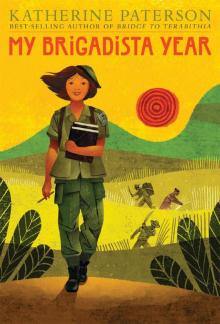 My Brigadista Year
My Brigadista Year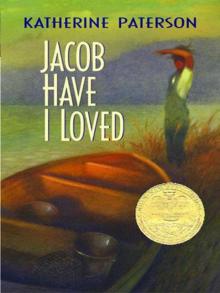 Jacob Have I Loved
Jacob Have I Loved Parzival: The Quest of the Grail Knight
Parzival: The Quest of the Grail Knight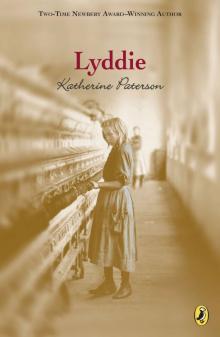 Lyddie
Lyddie The Day of the Pelican
The Day of the Pelican Stories of My Life
Stories of My Life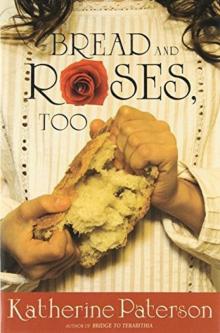 Bread and Roses, Too
Bread and Roses, Too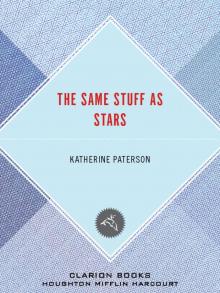 The Same Stuff as Stars
The Same Stuff as Stars